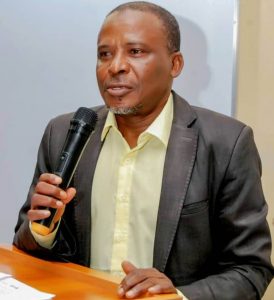Driving the digital transformation of Nigeria, By Y. Z. Ya’u
The National Information Technology Development Agency (NITAD) is a federal government agency with a mandate to regulate information technology and to drive its mainstreaming in the governance and economy of the country. In 2021, it started implementation of its new Strategic Roadmap and Action Plan (SRAP 2021-2024). This strategy aligns with the Federal Government National Digital Economy Policy and Strategy (NDEPS) which was developed by the Federal Ministry of Communication and Digital Economy. Among the goals of SRAP are massive training of Nigerian from all works of life to increase the rate of digital literacy and skills, to strengthen the Nigerian digital economy and increase ICT contribution to GDP and prepare and position Nigeria to benefit from the opportunities afforded by emerging technologies
Digital skills are critical today, not just for the collectivity as a nation but also for personal upliftment and transformation. Those who are digitally excluded because of either lack of appropriate skills or inability to access technology would be left behind educationally, financially, politically, and economically. This was why the UN launched its campaign for universal digital literacy with the clarion call, “No one should be left behind”. Indeed, one of the recommendations of the UN High-Level Panel on Digital Cooperation was “every adult should have affordable access to digital networks, as well as digitally-enabled financial and health services, as a means to make a substantial contribution to achieving the SDGs”.
Digital marginalization or exclusion is lived reality in Nigeria. This digital marginalization means that the marginalized groups would find it difficult to access education, thus posing a threat to attainment of the SGDs targets in the education sector and will not be able to benefit from the mainstreaming of ICTs in the health sector, again posing threats to achieving those targets in health sector. A key challenge therefore is for the country to quickly address the problems of digital exclusion and marginalization. Both NDEPS and SRAP speak to how to address this exclusion and marginalization. But while increasing connectivity and making technology readily available is a necessary condition for reaping the benefits of digital technology, it is not a sufficient condition for this. Citizens must have the appropriate digital skills to make effective use of technology.
Recognizing the importance of digital skills both documents (NDEPS and SRAP) have prioritized training by making digital skills to be a key pillar of their plans. Indeed, one of the targets of SRAP is to achieve 95% digital literacy in the country by the year 2025. While given its leadership role and mandate and as well as its authorship of SRAP, NITDA must lead this, state governments must however contribute to the realization of the goals and objectives of SRAP, particularly in relation to the digital literacy target.
NITAD has done a commendable work in terms of developing the document and it is already rolling out a couple of initiatives and programmes by way of implementation of SRAP as well as helping in getting the objectives of NDEPS realized but there are no commensurate responses from state governments whose citizens are to benefit from these laudable programmes. For instance, it has set up several digital entrepreneurship centres across the country. It is also rolling out digital training, especially in underserved and unserved communities as part of its contribution to bridge the digital divide.
Achieving 95% digital literacy in the country would mean that all students in schools from now henceforth must be digitally literate before they leave school. State governments have responsibility for both basic and secondary education. They owned the greater percentage of the schools at these levels of education in the country. It is therefore incumbent upon them to ensure that all the public schools in their ownership are properly and adequately provided with computers and supporting eco systems such that their students could acquire digital literacy.
In preparation for the massive digital training, NITDA is leading the articulation of the national strategy for child protection online. State governments do not seem to be doing anything about this and are not making the contribution they should make given that most of the children in the country are in their custody as pupils and students in schools owned by them. They need to bring their experience as custodians of children to bear to the process of developing the national strategy on child protection online.
The current culture of teaching computer studies as if the students are watching a match a between Manchester United and Manchester City must stop. States must make the necessary investment to provide computers, internet and power supply in schools and ensure that there are properly qualified teachers to teach the students. Digital literacy is not about hearing or seeing: it is hands, one that should be driven to fire the imagination toward creativity and innovative future. The current situation in which students cannot use computer laboratories in schools because of either lack of power supply or no internet or that there are no qualified teachers to train them must stop. Computers, given the dynamism of digital technology have short life span and once you do not use them, they quickly become obsolete and the investment in procuring them is wasted.
There is simply too much to be done to achieve the 95% digital literacy target of SRAP and all stakeholders must join NITDA for it is a necessary journey we, as a country must make. Our education system is changing fast, with speedy and uncertain migration online and that if we consider education as a right, the digital skills that are necessary to access it must also be a right. Gone are the days when states should think of computer as a luxury or some privilege that is to be provided only to some model schools or be kept as items of status symbol in some schools to be shown to visitors but not to be used by the students or even their teachers. Our children must use them and NITDA needs to hammer this point.
One obvious way states can make their interventions to be meaningful and sustainable is for them to have a state level ICT policy. We cannot continue to treat digital technology on a tap-water basis. A policy that spells out what we want to do with digital technology, how to use it and how to even deploy it, is critical to the goal of digital Nigeria. Are we going to use it as an enabler of other sectors, improving education, healthcare, governance, etc, for instance or are we going to see it as sector of its own, to create jobs and wealth or even consider it as both? NITDA has experience and has over the years, built a stock of practice to help mentor the states in doing this. Right now, apart from a few states, the majority do not have policies on ICTs and therefore engage with ICTs on an adhoc basis, making them to miss the opportunity to drive the optimum best out of it.
Another area that NITDA could avail itself of its experience and knowledge to the states is by mentoring them to set up state level ICT coordinating bodies like NITDA. This will help in terms of intergovernmental coordination, programmes harmonization and synergy building that are needed for effective objective delivery and sustainability of initiatives. If UBEC has SUBEBs at state level to work with, NITAD should have its own state counterparts too.
But state governments are not the only stakeholders that have to raise their hands up to prop the SRAP. Citizens needs to understand what digital technology is about, what it can do for their lives and their country and how they can position themselves so that they can leverage the opportunities technology offers for personal empowerment as well as contribute to the digital transformation of the country. Digital technology is about people and therefore its deployment is a collective responsibility. State governments must in addition to making digital investments in their schools, engage in stakeholder’s sensitization and mobilization. Afterall, they are closer to the people than NITDA is as a federal agency. While young people who are still in school have a self-obvious reason to be digitally literate, adults need to know what incentives for them are to be digitally literate. That is a job state-level agencies have to perform.
In this, NITAD also needs the support of organizations, individuals to build a bold voice about building the very foundation for citizens to embrace digital opportunities, which is raising awareness about the technology itself. Once citizens are aware, they will help government to increase availability, such as getting communities to build community networks to address their connectivity gaps or build community digital centres to address their digital skill gaps. All that is needed here is for government to follow up the work that NITDA is doing with appropriate policies that can make the eco system adequate and sufficient for the digital transformation of Nigeria. For instance, it is important to urge both Nigeria Communication Commission (NCC) and the Ministry of Communication and Digital Economy to quickly come up with the National Policy on Community Networks, which is required to address connectivity gaps that market cannot.
It is important that we call on all state governments to do the needful to endure that that the initiatives that NITDA is implementing do not run to the drain because of lack of support from states.
State governments have always been the weak link in our national digital quest. One can easily recall how they kept dithering over the implementation of the decision to make computer studies compulsory. For years, they kept shifting the goal, arguing that they did not have the resource to equip their schools and to get qualified teachers to teach computer studies in their schools. They should not be allowed to play the same dance this time around, because the world cannot wait for Nigeria and now is the time to move.
Y. Z. Ya’u, CITAD



